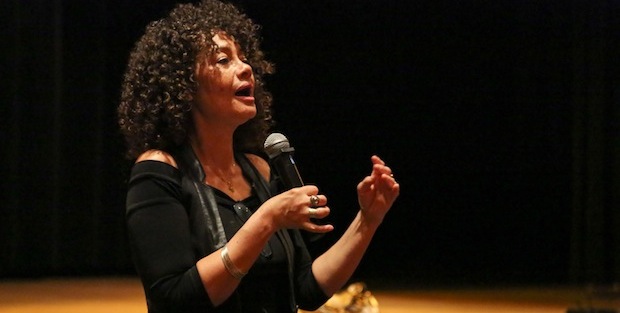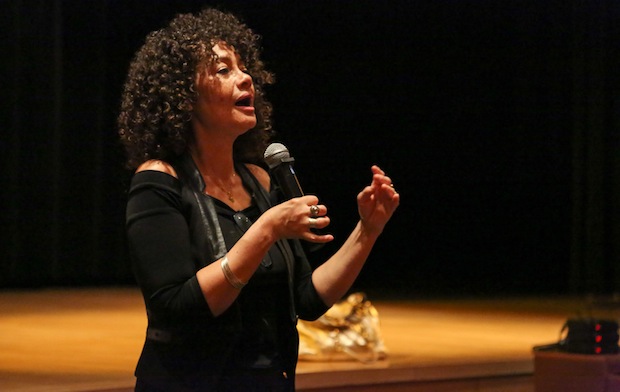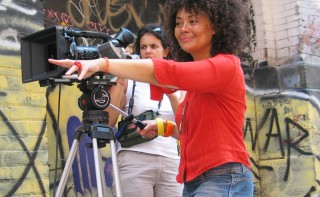Mariette Monpierre, director of the movie “Elza” shown on Wednesday, March 6th at the Lycée.
As part of the monthly movie series organized by Pascale Richard, the Director of our Cultural Center, we had the immense good fortune this past Wednesday of being able to show the film “Elza” by Mariette Monpierre (please the New York Times review here). Alas, I had a “conseil de classe” that evening and missed the projection, but did arrive in time for the last few minutes of the Question and Answer session with the filmmaker and was deeply moved by what I heard.
When I arrived in the auditorium, Ms. Monpierre was talking about how in the process of growing up as children and constructing the identities which become ours as adults it is extremely important that those around us show respect for whatever it is that makes us singular, for our specificities, for the differences which are ours as human beings. In the absence of respect for the diversity we each embody in our own ways, Mariette Montpierre seemed to be saying that it will be hard, perhaps even impossible for us to find happiness. And it is only when we are able to experience the respect of others for who we are as individuals that we will be able to live in harmony with the world and to fulfill the potential we have inside of us.
What is respect?
In listening to Ms. Monpierre, I could not help but be reminded of the book Respect by Sara Lawrence-Lightfoot, professor of sociology at the Harvard University Graduate School of Education (for insight into this wonderful text and exceptional writer, I recommend that you watch the interview Lawrence-Lightfoot gave to Charlie Rose, our Honoree at next week’s Gala: http://www.charlierose.com/view/interview/4246).
What I have never forgotten since first reading Respect several years ago is what Professor Lawrence-Lightfoot writes about the manner in which we often talk about the concept of respect in both private and public discourse. Often, she says, we tend to think of respect as “deference to status and hierarchy” (Lawrence-Lightfoot, Respect, Cambridge, Massachusetts: Perseus Press, 2000, p. 9) when it should really be understood as an exercise in symmetry.
Mariette Monpierre shooting “Elza”.
Lawrence-Lightfoot writes: “Usually, respect is seen as involving some sort of debt due people because of their attained or inherent position, their age, gender, class, race, professional status, accomplishments, etc. Whether defined by rules of law or habits of culture, respect often implies required expressions of esteem, approbation, or submission (pp. 9-10). ”
Considering the other as equal
Yet respect in its truest sense is something which is only possible when people consider each other as equals, when it is rooted in a recognition and celebration of the other as embodying the same humanity as ourselves, when respect is an expression of appreciation, trust and empathy for those around one.
How very lucky we are at the Lycée Français de New York. The fact that our school is such a profoundly pluricultural place, with students and faculty and staff and parents from an extraordinary diversity of religious, ethnic, cultural, socioeconomic, linguistic and other backgrounds, makes it an especially respectful place. The relationships which prevail among those who study and work in our educational community clearly have Lawrence-Lightfoot’s definition of respect at their center. For us, respect is something which it is our responsibility and pleasure to give as well as to receive.
About the Author :
Sean Lynch was Head of School at the Lycée Français de New York from 2011 to 2018, after having spent 15 years at another French bilingual school outside of Paris: the Lycée International de St. Germain-en-Laye. Holding both French and American nationalities, educated in France (Sciences Po Paris) and the United States (Yale), and as the proud husband of a French-American spouse and father of two French-American daughters, Sean Lynch has spent his entire professional and personal life at the junction between the languages, cultures and educational systems of France and the United States. In addition to being passionate about education, he loves everything related to the mountains, particularly the Parc National du Mercantour.



